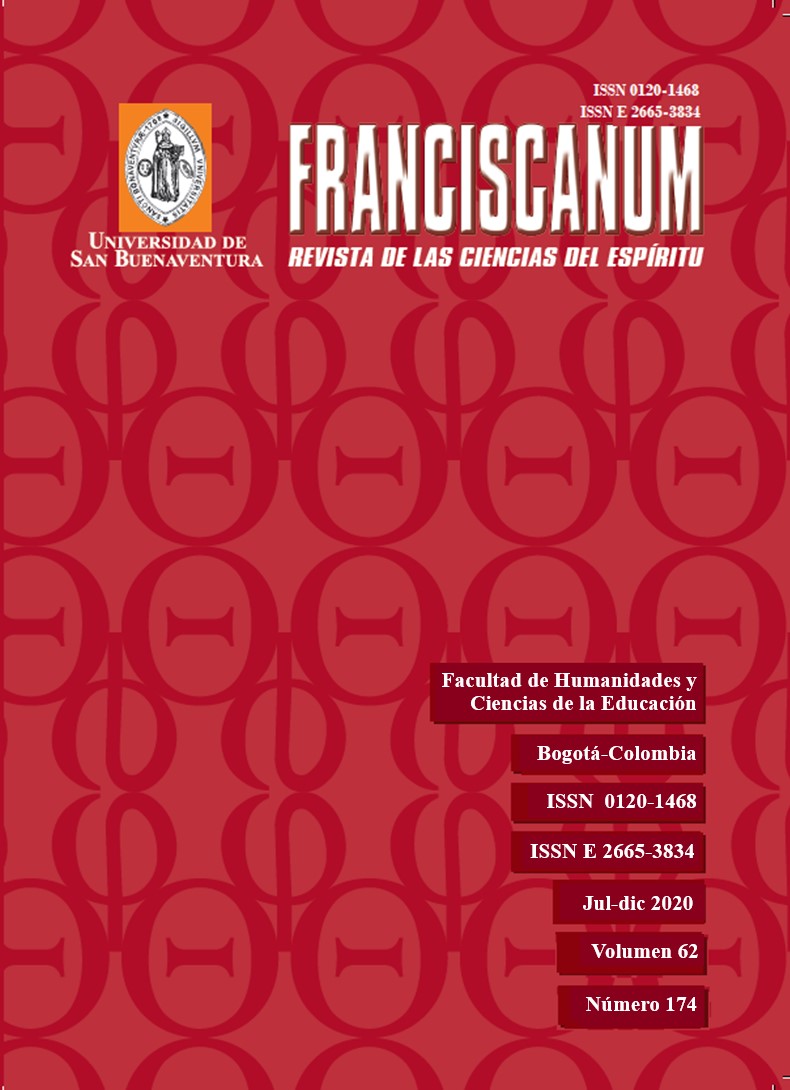Esta revista proporciona un acceso abierto inmediato a su contenido, basado en el principio de que ofrecer al público un acceso libre a las investigaciones ayuda a un mayor intercambio global de conocimiento.
Por tanto se acoge a la Licencia Creative Commons 4.0 Atribuciones Reconocimiento – CompartirIgual (by-sa): Se permite el uso comercial de la obra y de las posibles obras derivadas, la distribución de las cuales se debe hacer con una licencia igual a la que regula la obra original.
http://creativecommons.org/licenses/by-sa/4.0/
En este mismo sentido y en consonancia con la política del Acceso abierto, se aclara que los autores mantienen sus derechos sobre los artículos, sin restricciones y, del mismo modo, mantienen sus derechos de publicación, sin restricciones. Solamente se les solicita que referencien el número de la revista Franciscanum en donde apareció inicialmente el artículo.
Resumen
Este artículo analiza desde una perspectiva fenomenológica-hermenéutica los aportes del pensamiento franciscano en los procesos de autoevaluación institucional de la Universidad de San Buenaventura, Bogotá. En primera instancia, se abordará el pensamiento franciscano como elemento que transversa las funciones sustantivas y todas aquellas actividades que propenden por el aseguramiento de la calidad y el mejoramiento continuo de la educación superior. En segundo lugar, se describen los significados y opiniones sobre el sistema de autoevaluación institucional en los diferentes agentes de la comunidad académica Bonaventuriana en la sede Bogotá. Finalmente, se reconocerá cómo la filosofía institucional se materializa en los procesos de autoevaluación en el marco de los procesos de acreditación con el propósito de aportar elementos significativos para los planes de mejoramiento.
Palabras clave:
Referencias
Consejo Nacional de Acreditación. Lineamientos para la Acreditación Institucional (2018). Consultada en julio 15, 2019. https://www.cna.gov.co/1741/articles186359_Lin_Ins_2014.pdf
Gialdi, Silvestre. «Fundamentos filosóficos franciscanos de justicia, paz y ecología» Cuadernos Franciscanos 96 (1991). Consultada en julio 15, 2019. http://www.franciscanos.net/teolespir/ecologiagialdi.htm
Hernández Sampieri, Roberto; Fernández Callado, Carlos y Baptista Lucio, Pilar. Metodología de la Investigación. México: Mcgraw-Hill / Interamericana Editores, 2010.
Iafrancesco, Giovanni Marcello. Acreditación de los centros educativos: autoevaluación y autorregulación. Bogotá: Cooperativa Editorial Magisterio, 2004.
Imbernon, Francisco. Calidad de la enseñanza y formación en el profesorado. Barcelona: Octaedro Editorial, 2014.
Lugo, Héctor Eduardo. «El pensamiento franciscano y la educación». Conferencia presentada en el Congreso internacional de educadores de colegios franciscanos: vigencia y prospectiva de la educación franciscana en América latina, Cali: Universidad de San Buenaventura, 2001.
Merino, Antonio. Humanismo franciscano, franciscanismo y mundo actual. Madrid: Ediciones cristiandad, 1982.
Ministerio de Educación Nacional. «La evaluación», Al tablero 38 (enero-marzo 2006). Consultada en julio 15, 2019. https://www.mineducacion.gov.co/1621/article-107321.html.
Ministerio de Educación Nacional. Sistema nacional de información de la educación superior – SNIES, Glosario. Bogotá: Ministerio de Educación Nacional, 2019. Consultada en julio 15, 2019. https://www.mineducacion.gov.co/sistemasdeinformacion/1735/articles-213912_glosario.pdf
Ministerio de Educación Nacional, Consejo Nacional de Educación Superior, CESU, 2018. Consultada en julio 15, 2019. https://www.mineducacion.gov.co/1621/article-136460.html.
Patiño, William Arley. «La Propuesta de Francisco de Asís, como alternativa de vida ante la crisis de sentido del hoy». El Ágora USB Revista de Ciencias Sociales 2, Vol.15 (2015). Consultada en julio 15, 2019. http://revistas.usb.edu.co/index.php/Agora/article/view/1630/1440.
Presidencia de la República. Decreto 2904 de 31 de diciembre de 1994. Consultada en julio 15, 2019. https://www.cna.gov.co/1741/articles-186370_Marco_Normativo_CNA_2016.pdf.
Proantioquia - Fundación para el desarrollo. «La evaluación institucional: retos y oportunidades». Revista Magisterio (2017). Consultada en julio 15, 2019. https://www.magisterio.com.co/articulo/la-evaluacion-institucional-retos-y-oportunidades.
Rivera Aya, Eliasib Naher. «Alcances y limitaciones de la acreditación en algunos programas de Educación Superior. Revista educación y desarrollo social 2, Vol. 6 (2012): 45-64. Consultada en julio 15, 2019. https://revistas.unimilitar.edu.co/index.php/reds/article/view/760/512,
San Buenaventura. Epistula de tribus quaestionibus ad magistrum innominatum. En Opere di san Bonaventura. Introduzione generale. Roma: Città Nuova, 1990.
Universidad Militar Nueva Granada. Sistema institucional de autoevaluación, innovación y calidad. Bogotá: UMNG 2009. Consultada en julio 15, 2019. https://repository.unimilitar.edu.co/bitstream/handle/10654/10613/sistemainstautoevaluacion2.pdf?sequence=1&isAllowed=y.
Universidad de San Buenaventura Colombia. Proyecto Educativo Bonaventuriano. Bogotá: Universidad de San Buenaventura, 2010.
Universidad de San Buenaventura. Informe de Autoevaluación Acreditación Institucional Multicampus. Bogotá: Universidad de San Buenaventura, 2015.
Van Manen, Max. Investigación educativa y experiencia vivida. Ciencia Humana para una Pedagogía de la Acción y la Sensibilidad. Barcelona: Idea Books, 2003.
Van Manen, Max. Fenomenología de la práctica. Popayán: Universidad del Cauca, 2016.



















